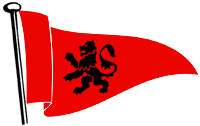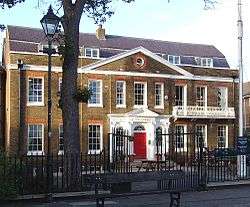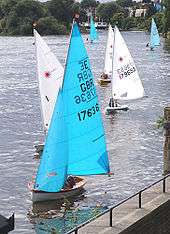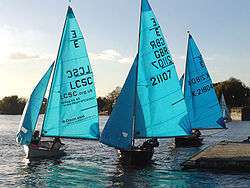London Corinthian Sailing Club

The London Corinthian Sailing Club is based on the river Thames at Hammersmith. Its activities include Dinghy sailing and racing on the river, and yachting in the Solent and further afield, as well as an active social side including 'Club Nights' every Tuesday evening.
An RYA-approved offshore training establishment with a full training programme is provided, including RYA theory and practical courses for Competent Crew, day skipper, coastal skipper and yachtmaster.
Dinghy racing takes place most weekends throughout the year and some evenings during the summer. Mostly dinghies raced are Enterprises and Lasers. In addition to sailing at Hammersmith, there are regular events against other dinghy clubs on the Thames and clubs further afield.
The yachting programme includes cruises (around the UK, cross-channel, in the Mediterranean and the Caribbean), training weekends, treasure hunts and races organised by the club. The club also participates in winter and spring series racing in the Solent, Cowes Week, Round the Island Race, Cork week, offshore JOG races, RORC races, the Fastnet race and some member-organised events.
The clubhouse is a Georgian building with river views and full facilities.
History

The club was established as the Corinthian Sailing Club in 1894, by a group of sailing enthusiasts who launched their boats from Bell Steps, beside the Black Lion pub, and close to the Hammersmith and Chiswick border. In the early years the members were all men and used to meet at each other's homes to discuss sailing matters and racing. It was then discovered that a new member owned a pub closer to the City and meetings were promptly convened there instead.
This stretch of the Thames tideway was also originally home to the London Sailing Club, which rented a clubhouse directly on the river between The Dove and The Rutland pubs. When the London Sailing Club moved down river towards Essex, the Corinthians were offered the lease of this building and changed their name to the London Corinthian Sailing Club. Boats were moored on the tidal water and at a later date on land when space became available.
For the first forty years or so members built and owned various designs and sizes of boats and a complicated method of handicapping races was devised. During the Second World War the club was asked to provide boat and sailing training for the Royal Air Force. Celestial navigation classes were also started about this time by Dr. Olaf Bradbury and today the club is a West London centre for shore based navigation classes.
After the Second World War the club grew in popularity and became very influential in dinghy design and racing. The club has long associations with Uffa Fox and Jack Holt, designers and builders of famous dinghy classes (Fireflies, Enterprises, GP 14's, etc.). Other classes sailed on this stretch of the river included the Swordfish, International 14, OK, Merlin, Cadet, Mirror and in recent years the Laser and RS200.
The clubhouse suffered severe bomb damage from a V-1 flying bomb during the latter part of the war. Repairs were undertaken, but the structure's days were numbered. Due to significant bomb damage surrounding the clubhouse the Hammersmith Town Council decided that the area should be razed and public gardens created (Furnival Gardens).
The old clubhouse was finally demolished and in the early 1960s the London Corinthians were relocated 200 metres up river to Linden House,[1] a gracious refurbished Georgian building. This new accommodation provided room for future growth and a superb environment for sailing tuition and social functions. Simultaneously, secure covered accommodation for over 100 boats was constructed beneath a development of adjacent flats. Launching ramps, spacious pontoons and a race officers' starting box were installed next to the river.
Throughout the years the London Corinthians have welcomed a broad and diverse membership. It was one of the first London clubs to allow women boat owners and sailors to participate in this hitherto 'male only' sport. Rupert D'Oyly Carte the opera impresario, and his brother Lucas, and musician Leon Goosens were former members. Athlete Roger Bannister, scientist and broadcaster Dr. Magnus Pyke and naturalist Sir Peter Scott all sailed at the club. The reformist MP and author of the popular novel 'The Water Gypsies', A P Herbert, was a solid supporter of the Club throughout his life and his son John was until recently the club's President.
At Sport England's suggestion the LCSC formed the registered charity The London Corinthian Trust (roughly 1998) to purchase Linden House and to safeguard the building for sports use in perpetuity. The Trust owns and maintains Linden House, which is the clubhouse for the London Corinthian Sailing Club and the Sons of the Thames Rowing Club. Donations to further the trust's work are greatly appreciated. Linden House is a popular venue for meetings and private celebrations. For much more about Linden House and the trust see the Linden House link below.
The club continues to grow and is experiencing resurgence in river dinghy sailing. Much of this is due to increased public awareness, availability of club owned boats for members to hire and the popular 'come and try it' weekends that encourage novices onto the water for the first time.
The club is committed to expanding recreational sailing and racing on the Thames and a number of initiatives are being brought forward to safeguard the long-term future of this sport on the tideway.
The club's offshore group continues to grow and in 2007 several teams entered the prestigious Fastnet race. Various rallies, treasure hunts and races are organised on the South Coast, with charter cruises further afield. The club has expanded its shore based theory classes and now offers a wide range of RYA courses, including Yachtmaster and Day Skipper. The club's social events at Linden House are very popular and both informal and formal events are organised throughout the year.
See also
References
External links
Coordinates: 51°29′26″N 0°14′20″W / 51.490592°N 0.238821°W
-

Enterprises and Lasers racing on the river Thames
-

Enterprises racing on the river Thames